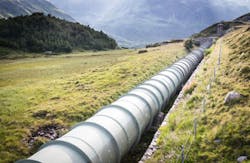A new report claims that TransCanada's proposed Energy East pipeline would pose a threat to Manitoba's drinking water supply.
The C$12-billion pipeline would carry 1.1 million barrels of oil per day from Alberta and Saskatchewan to refineries in Eastern Canada. But the report commissioned by the Manitoba Energy Justice Coalition said there is a risk that a rupture would send oil into waterways that feed into municipal water supplies.
This, the coalition of environmental groups claim, would directly threaten the drinking water of more than 850,000 Manitobans, including the entire population of Winnipeg.
The scientific report, prepared by retired biophysicist Dennis LeNeveu, says that every township in Manitoba has roads with ditches that channel water into streams or drains around Winnipeg and other municipalities. According to the report, this means that if the Energy East pipeline ruptured, closing the valve on a major water crossing would not necessarily be effective as a rupture on even a minor water crossing could drain into waterways that local people depend on for water.
One section of the pipeline would partly run underneath an aqueduct that supplies drinking water to Winnipeg from Shoal Lake, Ontario. The entire length of the 100-year-old aqueduct is in danger of contamination from the pipeline, the report said.
LeNeveu told the Canadian Press: "Small, continuous, undetected leaks will occur and seep unseen into the ground causing ground and surface water contamination. One spill, one leak — it doesn't have to be a big leak — almost anywhere along that line can be carried over our aqueduct."
Responding to the report, TransCanada spokesman Tim Duboyce said that the company operates 70,000 kilometers (43,500 miles) of pipelines and has never had a large-scale leak on its oil lines. While there have been small-scale leaks, these are detected by remote sensors or other leak-prevention programs, and where pipelines run close to waterways the company increases the thickness of the pipe and uses remote-controlled devices to detect any faults before they cause problems, the Winnipeg Free Press reported.


